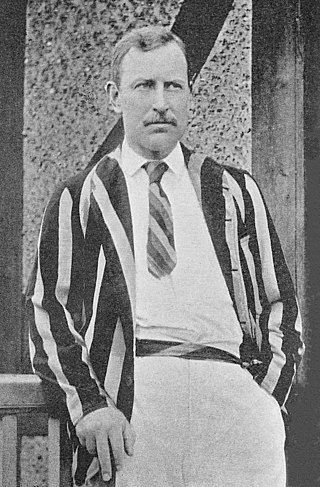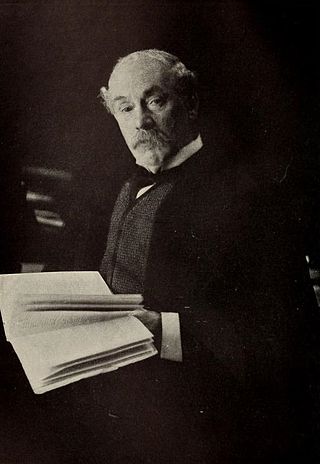Related Research Articles

William Henry Waddington was a French statesman who served as Prime Minister in 1879, and as an Ambassador of France.

Charles Cowden Clarke was an English author who was best known for his books on Shakespeare. He was also known for his compilation of poems as well as his edition of The Canterbury Tales, which was rendered into prose and widely used.

Mary Devenport O'Neill was an Irish poet and dramatist and a friend and colleague of W. B. Yeats, George Russell, and Austin Clarke.

Edward Clarke Cabot was an American architect and artist.

Alfred Perry "Bunny" Lucas was an English first-class cricketer from 1874 to 1907, playing for Cambridge University, Surrey, Middlesex and Essex. He also played five Test matches for the England cricket team.

Julius von Mohl was a German Orientalist.

Shire of Broadsound was a local government area in the Capricornia region of Queensland, Australia. The Shire, administered from the town of St Lawrence, covered an area of 18,546.0 square kilometres (7,160.7 sq mi), and existed as a local government entity from 1879 until 2008, when it was amalgamated with the Shires of Belyando and Nebo to form the Isaac Region.

The Shire of Clifton was a local government area in the Darling Downs region of Queensland, Australia, southwest of the regional city of Toowoomba. The shire, administered from the town of Clifton, covered an area of 867.5 square kilometres (334.9 sq mi), and existed as a local government entity from 1879 until 2008, when it amalgamated with several other councils in the Toowoomba area to form the Toowoomba Region.
The 4th Parliament of Ontario was in session from June 5, 1879, until February 1, 1883, just prior to the 1883 general election. The majority party was the Liberal Party led by Oliver Mowat.
Sir Edward Herbert Bunbury, 9th Baronet, known as Edward Bunbury until 1886, was an English Barrister and a British Liberal Party politician.

James Arthur Roberts was an American lawyer and politician.

Sir Caspar Purdon Clarke was an English architect and museum director.
Joseph Rawson Lumby (1831–1895) was an English cleric, academic and author and divine, Norrisian Professor of Divinity from 1879 and then Lady Margaret's Professor of Divinity from 1892.
Ven. Henry Edward James BevanFRSL was an English Anglican divine.
Lieutenant-Colonel Sir Marshal James Clarke was a British colonial administrator and an officer of the Royal Artillery. He was the first Resident Commissioner in Basutoland from 1884 to 1893; Resident Commissioner in Zululand from 1893 to 1898; and, following the botched Jameson Raid, the first Resident Commissioner in Southern Rhodesia from 1898 to 1905.

John Alexander Harvie-Brown was a Scottish ornithologist and naturalist.
John Eustace Prescott was an Anglican priest and author in the late nineteenth and early twentieth centuries.
Robert Bell, D.D. (1808-1883) was Archdeacon of Cashel from 1879 until his death.

John Eldridge Bruce was an American lawyer, politician, and civil servant. He served in the Ohio House of Representatives and mayor of College Hill, Ohio. Bruce became the personal attorney to Ban Johnson, the president of the American League, and Bruce served as the secretary of the National Baseball Commission from 1903 to 1920.
References
- ↑ Fryde, E. B.; Greenway, D. E.; Porter, S.; Roy, I., eds. (1986). Handbook of British Chronology (3rd, reprinted 2003 ed.). Cambridge: Cambridge University Press. ISBN 0-521-56350-X.
- ↑ Crockford's Clerical Directory 1908 p 274: London, Horace Cox, 1929
- ↑ The Biddulph Family of Rathrobin and Vicarstown